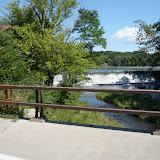It may be this combination of factors that relax the body and mind, so that both are open and receptive to suggestion. The signs and symbols along the way take on deep and meditative qualities that under other circumstances are glossed over by everyday stress. Things seen yet unseen, voices heard, yet never understood, messages sent, but never received are somehow delivered more easily. In the saddle the world is seen so differently. I sometimes think of astronauts viewing the earth in ways we never will. It is the same earth; it is the perspective that changes everything.
So it is in this way that my perspective is seeing things from a whole new angle. I see three signs in our journey that are sticking to me like pucker brush. I can’t just brush them away; I am made to pay attention. The first is a church placard that reads “God wants full custody, not just weekend visits.” One can easily imagine that what the poster is intending us to think about, is that we should not just occupy space in a pew on the weekend, but live our lives as loving and caring human beings. Or it may cause one to feel a twinge of guilt at even missing the “weekend visit.” It is possible that both of these messages fit me, but somehow, it doesn’t quite sit right. Then I realize that God does have my full custody. Anyone who rides a motorcycle already understands that they are never alone in the saddle. Our lives are entirely in the hands or our creator. Our skill level has little to do with what others are doing around us. Each time I throw a leg over the saddle, and before I kick into gear, a silent prayer has already taken wing. I am not alone, God has full custody and He or His messengers are at my side.
“Former site of Olive” is the next sign that has burrs. I can’t shake the thoughts of the people displaced by the creation of the reservoirs. Neversink and Bittersweet, New York, are now under the Neversink Reservoir; the towns of Olive, West Shokan, Brodhead Bridge, Brown's Station, Boiceville, West Hurley, Glenford and Ashton (in the Catskills) were sacrificed to create Ashokan Reservoir. If we “drill down” from town, to street to household, to individual, there was someone here who made a sacrifice for the good of many. Whether willingly or unwillingly their sacrifice was made for the common good. What happened to all these people? Do any of the thousands of people ever contemplate the fate of these folk when they turn the tap? My sister tells a story of her father-in-law, who will point out town landmarks over and over accompanied by the same old stories again and again. So often in fact, that the good mother-in-law once proclaimed, “Erect a plaque already!” or words to that effect. These folks cannot bring their grandchildren here and say “this is where I was born.” It is a memory of words only, as you look across the water. The lesson here? We never fully appreciate the sacrifices others have made for our welfare.
With the “former sites” still burning images in my mind, how we are all interdependent gripped my heart as well. I realize with more clarity that what happens to you happens to me too. As if this message was the theme of the day, the next sign on the road reads “eat here, or we’ll both starve.”
 |
| Catskills |












No comments:
Post a Comment